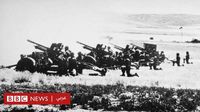Fifty-seven years ago, on March 21, 1968, one of the most significant battles in the history of the Arab-Israeli conflict took place—the Battle of Karameh. Lasting for just 15 hours, this fierce engagement marked the first victory for Arab forces against what was perceived to be the invincible Israeli army. The resonance of this battle can still be felt today, especially as it became a profound symbol of resistance amidst decades of conflict.
The backdrop to this decisive confrontation dates back to earlier moments in the region's tumultuous history. In 1948, the establishment of Israel plunged the Arab world into despair, known as the Nakba, or catastrophe, leading to significant territorial losses for Arab states. Fast forward to June 1967, when Israel’s rapid victory during the Six-Day War sealed its control over vast areas including the Sinai Peninsula, the Golan Heights, Gaza Strip, and parts of the West Bank and East Jerusalem.
After the 1967 war, Israeli forces were emboldened and prepared for further military action. They executed military maneuvers near the Jordanian border, eyeing the territory as tensions continued to simmer. The 'fedayeen,' or Palestinian fighters, were already launching attacks from these positions, prompting a coordinated effort between them and the Jordanian army in preparation for the inevitable confrontation.
As tensions escalated, the Jordanian army closely monitored Israeli movements and engaged in sporadic skirmishes. This was compounded by Jordan's support for Palestinian fighters, creating a tense battlefield atmosphere. As a result, the stage was set for a decisive clash on that fateful day in March.
At approximately 5:30 AM on March 21, Israeli forces commenced their assault, employing tanks, aircraft, and infantry in a coordinated offensive launched from three key axes: Jesser Swaimeh, Jesser al-Malek Hussein, and Jesser Damia. King Hussein of Jordan later recounted the ferocity of the engagements, stating, "The clash was bloody between the two sides; there were human losses, destruction of equipment... Indeed the fedayeen captured attention with their awe in combat, fighting alongside Jordanian forces heroically and effectively."
The ferocious battle quickly took its toll on both sides. The Jordanian military prepared well, demonstrating capability and even surprising Israeli forces with its performance. Israeli aims, however, remained unchanged; they sought to neutralize the Palestinian base camps immediately. They operated under the assumption that the Jordanian army would not intervene on behalf of the 'fedayeen,' a misconception that would soon prove critical.
As fighting raged, it became increasingly apparent that Israeli expectations had not aligned with reality. Ahmad Jibril, a prominent figure in the Palestinian struggle, attested that the Jordanian forces actively engaged and were well-coordinated, effectively turning the tide against the invaders. "The Israeli army refuses to say it was defeated in the battle," journalist Dany Rubinstein noted, reflecting on the perception within Israel, "but it was a comprehensive failure to accomplish its objectives." This sentiment echoes throughout many discussions surrounding the battle, highlighting the nuanced understanding of victory and defeat.
By the end of the 15 hours of combat, more than 250 Israeli soldiers had reportedly lost their lives. Meanwhile, the Jordanian army suffered casualties numbering at 86, with a further 108 wounded. The official Israeli military assessment presented a significantly lower toll, yet many in the Israeli public viewed the combat losses as unacceptable given the expectations for a quick, decisive operation.
Amidst the confusion and chaos of battle, narratives around the aftermath began to emerge. Israeli leaders justified the operation as necessary, with Prime Minister Levi Eshkol stating, "We were forced to penetrate the ceasefire line because Jordan did not stop the fedayeen's actions," as reported in Al Ittihad newspaper shortly after. This explanation was met with skepticism as many questioned the operational competence displayed by the Israeli forces.
In light of the casualties on both sides, the Battle of Karameh has cultivated a complex legacy, revealing deep-seated divisions in historical interpretations. Each side claims a version of victory, showcasing their narratives shaped by political and social contexts. The battle forged a lasting impression on the consciousness of both Palestinians and Jordanians, turning Karameh into a symbol of resilience and struggle.
Unquestionably, the path of discourse surrounding the Battle of Karameh reflects the broader historical narrative of the Israeli-Palestinian conflict. Many decades later, the event continues to be recounted with pride by Arabs, while often understated or denied by Israelis. Nonetheless, it remains a vital chapter in the ongoing saga of war and peace in the region, as both sides grapple with their contentious past.
As we reflect on this pivotal event, it becomes deeply clear that the ideologies, memories, and emotions tied to the Battle of Karameh cultivate an enduring influence on political narratives still relevant today. The battle has become more than just a military clash; it is emblematic of the struggle for identity, sovereignty, and recognition, a narrative fraught with complexity that continues to shape the lives of millions.




